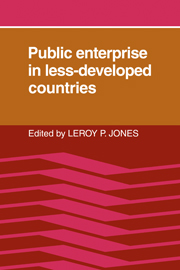Book contents
- Frontmatter
- Contents
- List of contributors
- List of figures and tables
- Preface
- 1 Introduction
- Part I Why public enterprise?
- 2 Role of economic factors in determining the size and structure of the public-enterprise sector in less-developed countries with mixed economies
- 3 Political economy of public enterprise
- Part II Principal-agent relationships: Who should control public enterprises?
- Part III How are decisions made in practice?
- Part IV How do public enterprises behave in international markets?
- Part V How does risk alter public-enterprise decisions?
- Part VI How are incentive structures to be designed?
- Part VII How does public enterprise compare with other intervention mechanisms in overcoming particular problems?
2 - Role of economic factors in determining the size and structure of the public-enterprise sector in less-developed countries with mixed economies
Published online by Cambridge University Press: 04 August 2010
- Frontmatter
- Contents
- List of contributors
- List of figures and tables
- Preface
- 1 Introduction
- Part I Why public enterprise?
- 2 Role of economic factors in determining the size and structure of the public-enterprise sector in less-developed countries with mixed economies
- 3 Political economy of public enterprise
- Part II Principal-agent relationships: Who should control public enterprises?
- Part III How are decisions made in practice?
- Part IV How do public enterprises behave in international markets?
- Part V How does risk alter public-enterprise decisions?
- Part VI How are incentive structures to be designed?
- Part VII How does public enterprise compare with other intervention mechanisms in overcoming particular problems?
Summary
Introduction
The issues
What is to be explained is the size and structure of the public-enterprise sector in mixed economies, in particular those in less-developed countries (LDCs). The numerous reasons for establishing or retaining public enterprises can be consolidated into four groups:
Ideological predilection
Acquisition or consolidation of political or economic power
Historical heritage and inertia
Pragmatic response to economic problems
Although we will be concerned primarily with the fourth (economic) group of factors, we begin by briefly considering the competing-complementary explanations. Causation is multiple, and it is necessary to be explicit about what is being left out as we focus on economic determinants.
Ideological predilection
What does it mean to say that ideology has influenced the choice of public enterprise? We take it to mean that the decision rests not upon an unbiased examination of means in relation to ends in a particular case but upon a prior belief that certain forms of organization are generally preferable to others.
Work on this chapter was partially supported by a Ford Foundation grant to the Boston University Public Enterprise Program. We are indebted to Peter Evans, Richard D. Mallon, Jan Tinbergen, and John Sheahan for their comments on an earlier draft.
This does not imply that all choices influenced by ideology are irrational. In some cases the decision would be the same if based on an unbiased examination of the relation of means to ends. More important, ideology can influence ends as well as means. A belief in the merits of a “socialist pattern of society” can lend extra value to expansion of employment or redistribution of income, favoring investment decisions promoting those ends.
- Type
- Chapter
- Information
- Public Enterprise in Less Developed Countries , pp. 17 - 48Publisher: Cambridge University PressPrint publication year: 1982
- 12
- Cited by



